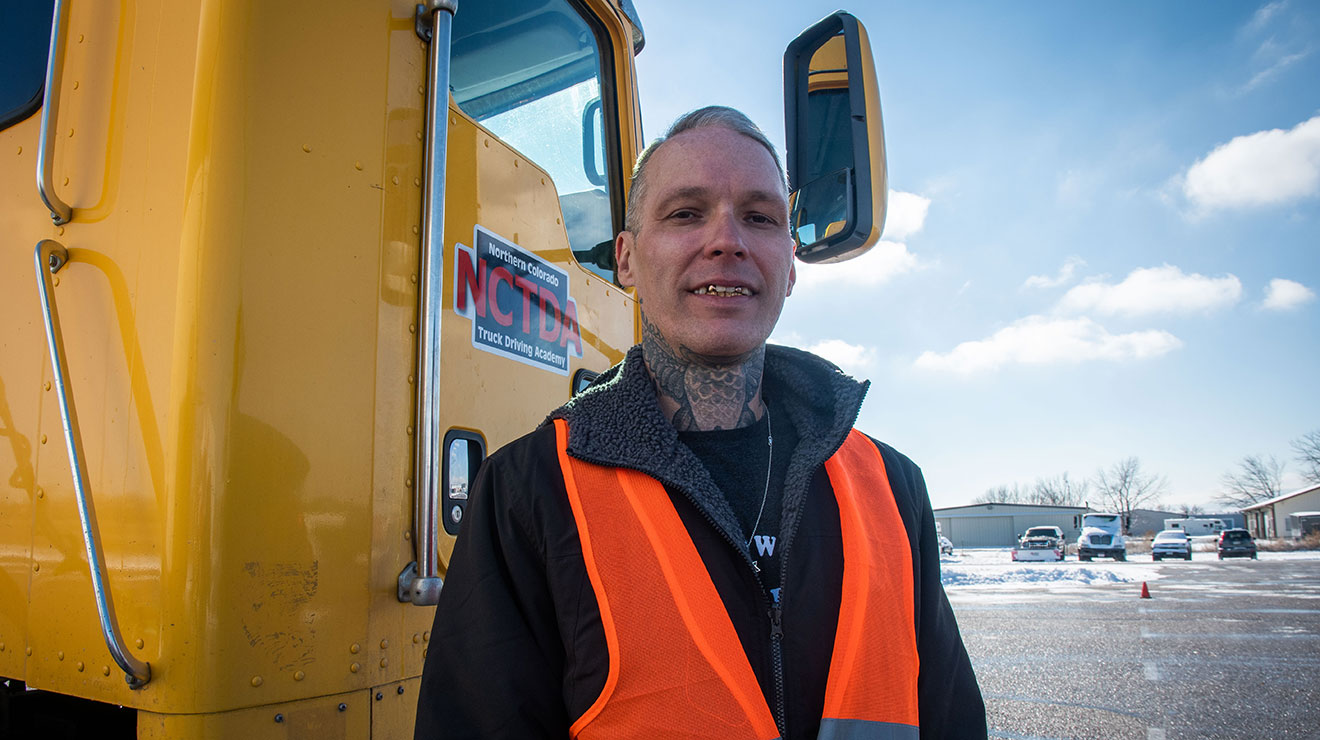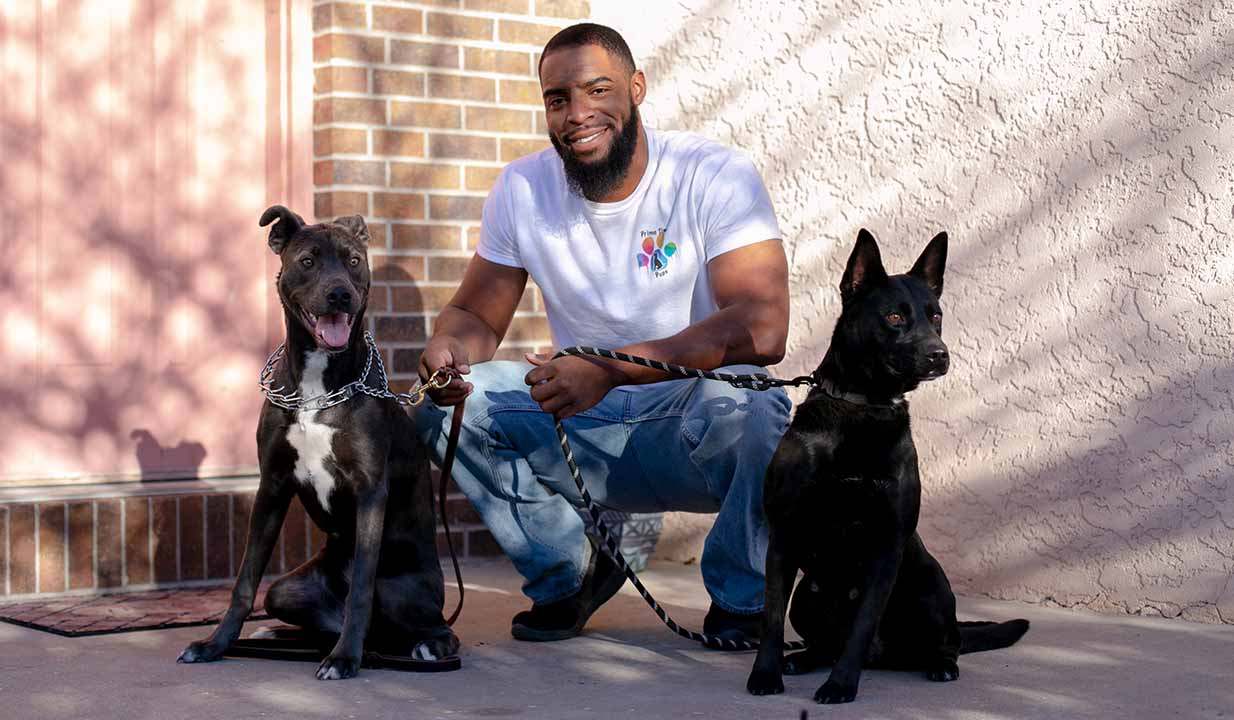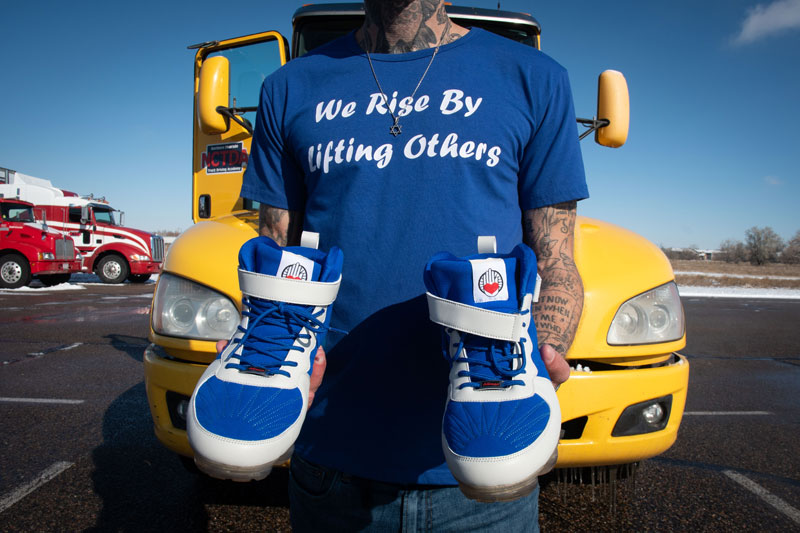
Joshua Kenyon earned two associate degrees while incarcerated. He’s now working towards a commercial driver’s license and has launched his own shoe brand. Photo by Moe K. Clark / Special to The Colorado Trust
Joshua Kenyon earned two associate degrees while incarcerated. He’s now working towards a commercial driver’s license and has launched his own shoe brand. Photo by Moe K. Clark / Special to The Colorado Trust
Joshua Kenyon pulled a lot of all-nighters while incarcerated at Trinidad Correctional Facility, a state prison in southeast Colorado.
As an enrolled college student through Trinidad State College, he had what felt like an endless amount of homework assignments to complete. But the long nights were worth it. He’d enrolled in college courses after his sentence for drug-related crimes was reduced in 2018.
“All of a sudden, there was life at the end of the tunnel and I was gonna get out of prison,” said 44-year-old Kenyon. “I took a real hard look at myself and knew I didn’t want to end up in this situation again. I knew that I had to change some things.”
Kenyon, who received two associate degrees while in prison, was part of a national pilot program that provides financial assistance to incarcerated students pursuing college degrees. The pilot program, called the Second Chance Pell Experimental Sites Initiative, includes nearly 200 higher education institutions across the country.
Starting July 2023, significantly more incarcerated people like Kenyon will be able to apply for federal Pell Grants to pursue college through the U.S. Department of Education for the first time in decades. The financial assistance—currently up to $6,895 per academic year—is awarded to low-income students to cover tuition and other educational expenses.
Approximately 463,000 incarcerated people in the U.S. could be eligible. Final rules were released on Oct. 28 for higher education institutions that plan to offer programs to incarcerated students in anticipation of the federal change.
Between 1972 and 1994, people in prison could apply for Pell Grants to pursue college. But the now-infamous 1994 crime law signed by former President Bill Clinton stripped incarcerated people’s eligibility. In response, prison college programs nationwide dwindled from 772 in the early 1990s to just eight in 1997, according to the Vera Institute of Justice, a national think tank and nonprofit working to end mass incarceration.
Currently, three higher education institutions in Colorado have been approved to offer prison programs through the pilot program: Trinidad State College, Adams State University and Pueblo Community College. The fledgling programs, the first which was launched in 2020, have had to navigate COVID-19 lockdowns, severe staffing shortages across the prison system, and technology delays.
Despite the challenges, Matthew Martinez, the prison college program director for Adams State, believes the Pell Grant eligibility expansion and new programs coming online are going to revolutionize education behind bars.
“There are a ton of students that are interested or really motivated and I think would do extremely well in this program,” he said. “They just haven’t had the money to do it. It’s a game-changer.”
Annie Skinner, a spokesperson for the Colorado Department of Corrections (CDOC), said the department believes the programs will improve public safety. Those who participated in a college-in-prison program are 28% less likely to return to prison once released, according to a 2018 study by the RAND Corporation. (It would also reduce incarceration costs in Colorado by about $7 million annually, per a 2019 analysis by Vera.)
“This education is an opportunity for people to have a chance and to put them on a path to not recidivate, which helps us all,” Skinner said.
Trinidad State College leads the way
When Trinidad State College launched its Second Chance Pell program in 2020, LiAnn Richardson, the director of the program, was only planning on offering their programs in three facilities. Two years later, they have programs in 13 Colorado state prisons and have enrolled nearly 200 incarcerated students in college. So far, 45 students have graduated with a degree.
Through the Second Chance Pell program, Trinidad offers two main degrees: an Associate of Applied Science and Technology, and an Associate of Arts in either general studies or psychology.
“We purposely chose psychology for a few reasons,” Richardson said. “All of the classes were guaranteed transfer classes. That means that if they leave prison and they go to another college in Colorado, we know that they’re going to accept their credits.”
Adams State University in Alamosa will soon offer degree programs through the Second Chance Pell program in three separate facilities: sociology at Denver Women’s Correctional Facility, and business at Four Mile Correctional Facility and Colorado Territorial Correctional Facility, according to Martinez. They are hoping to launch their programs for the spring semester.
Pueblo Community College was also selected for the pilot program and plans to have programs launched for the spring semester as well. Amy Matthew, a spokesperson for PCC, said the college will offer two degree programs to start: small business ownership and behavioral health.
“Our hope is to continue to expand programming and provide a variety of diverse pathways for students, and encourage them to continue with Pueblo Community College upon release,” Matthew said. “In addition to helping individuals, access to Pell can also help address the ‘skills gap’ because trained and educated graduates can return to their communities upon release with the relevant skills needed in the workplace.”
Getting students to believe they can pursue college despite being incarcerated is one of the biggest challenges, Richardson said. To help combat that, she assigns her business students the book Jump by Larry Miller, who received his degree in prison and works for Nike’s Jordan brand.
“The book is a little gritty in spots, but it’s inspiring to see somebody who took advantage of [college] in the 80s… and to see how far he’s taken that,” she said.
Trinidad also offers a business entrepreneurial certificate program for those looking to start their own business. Rio Davis, 36, received his certificate in 2021. He spent 12 years incarcerated in Colorado for an attempted robbery in his early 20s. The class taught him things like payroll expenses, how to overcome challenges in the workplace, and how to write a business plan.
After getting released from prison in February 2022, he launched his own dog training business in Colorado Springs called Prime Time Pups. He now works with nearby animal shelters to train therapy dogs, teach basic obedience and promote behavioral changes in aggressive dogs. He feels grateful that he was able to pursue higher education while behind bars—and is excited for more to follow in his footsteps.

Rio Davis with Piper (l.) and Lari (r.), two of the dogs in his care at Prime Time Pups in Colorado Springs. Photo by Parker Seibold / Special to The Colorado Trust
“The penitentiary offers a lot of classes like carpentry and computer classes… but a lot of times it’s things that people aren’t going to use,” he said. “We need to have more secondary education in the penitentiary because those are the classes that really change a person and empower a person to affect change once they’re out.”
A second chance at education
For Kenyon, taking college classes in prison felt like his first real chance at a proper education.
“I had been moved around my whole life. Ninth grade alone, I lived in five states and went to six different schools,” he said. “It was very hard to engage in any kind of education. So I never got a single high school credit and I dropped out in 9th grade.”
In 2003, he earned his GED while incarcerated in Missouri.
“I took the whole test in 45 minutes because it was commissary day and I was trying to get out of there,” he said. “I ended up getting a really, really good score. And that kinda made me think, you know, maybe I can do school now that I’m older.”
Incarcerated students must have graduated from high school or received their GED to enroll in a college program, and can only apply to programs that are approved by CDOC. To enroll, a student must go through the education staff at their prison.
When Kenyon first enrolled in the Second Chance program, he said other inmates looked at him “like he was crazy.” But then people started asking him what he was learning and how they could sign up.
“I felt like it changed a lot of people’s perceptions,” he said. “They were like, ‘This gangster is in college?’”
Since being released from prison, Kenyon has launched his own shoe brand and is in the process of getting a commercial driver’s license.

Kenyon holding a pair of shoes he designed. Photo by Moe K. Clark / Special to The Colorado Trust
Richardson said Kenyon and other incarcerated students are some of her highest-achieving pupils.
“They graduate summa cum laude. They’re applying for Phi Theta Kappa. They’re really dedicated students who want to learn,” she said.
“It really is a big deal that they’re graduating,” Richardson added. “We try to make it a big deal so that they understand that this was not just something that they did for a time—this was a big deal and it’s a milestone in their life.”
A certificate program in strategic communications
Benjamin Boyce is an instructor for the new college-in-prison program at the University of Colorado Denver, teaching communication classes for a certificate program at the Colorado Territorial Correctional Facility in Cañon City and the Sterling Correctional Facility in northeast Colorado.
The pilot program was launched in 2020 after students at the university protested the school’s contract with Colorado Correctional Industries, which at the time was providing inmate-made furniture for the campus.
“These were folks that were being forced to work for 50 cents, 40 cents a day sometimes, and they don’t have access to education,” said Boyce, who was formerly incarcerated and is the host of the podcast “Dr. Junkie,” focused on harm reduction and drug policy. “And here we are on the campus using the fruits of their cheap—almost slave labor—to educate ourselves in the ivory tower.”
The CU system cut back its involvement with the private prison operator in August 2020 and helped secure funding for the pilot program to which Boyce is now integral. Students enrolled in the program participate for free and receive a certificate at the end of the program. When they are done, they are one step closer to their associate’s or bachelor’s degree.
Boyce said he purposefully crafts his classes to benefit more than just the students enrolled in them.
“They’re coming in there and then they’re leaving, and they’re the leaders out in their units,” he said. “And everything we’re teaching is bleeding into that space in a way that is lowering tickets, it’s lowering the issues inside the prison and it’s giving people a way to get through their day.”
His goal is to help his students envision a future that’s different than their past.
“I know they’re stuck in a cage inside a huge prison,” he said. “But there are still ways to try to erase that barrier and give them ways to communicate.”
Staffing issues and technology backlogs
Some programs have had to delay their degree program implementation due to ongoing staffing shortages. As of Nov. 28, Colorado’s correctional system has 670 vacant correctional officers positions, with 1,706 openings in total across the department, according to Skinner.
“The result is teachers, educational staff and case managers have to cover security shifts,” said Martinez, who was recently elected to the Colorado House of Representatives, representing eight rural counties in southern Colorado.
Colorado’s correctional system is currently offering up to $7,000 bonuses at a handful of locations to try to recruit correctional officers and get them into the most impacted prisons. They have also dropped their COVID-19 vaccine mandate.
Martinez, in collaboration with CDOC, is working to implement a new program to hire incarcerated people who have earned master’s degrees as instructors within the prisons. He said they would be paid the same rate as an on-campus instructor. To start, they will only hire one or two, he said.
“To our knowledge, we’re the only institution that’s willing to do this,” he said. “That’s how committed [CDOC] is to getting an education in there.”
Another barrier to getting prison programs off the ground is technology access.
Melissa Smith, the deputy director of prisons for CDOC, said they are in the process of building computer labs at every state-run prison. But they are waiting on technology that’s on backorder.
“We’ve had our Wi-Fi hotspots on backorder for 22 months now,” Smith said. “We have enough Chromebooks to support all the students. We don’t have the Wi-Fi capacity or the infrastructure to support all the Chromebooks.”
Richardson, with Trinidad State, hopes that students will have more access to technology in the future, not just in the computer labs.
“If they had Wi-Fi in their housing units and permission to take their Chromebooks into their housing units, they would be able to do their classes on their time,” she said. “Some of them are juggling jobs and family and school. We can’t think just because they’re locked up, they have all this time.”

Davis believes secondary education opportunities for incarcerated people can “really change a person and empower a person to affect change once they’re out.” Photo by Parker Seibold / Special to The Colorado Trust